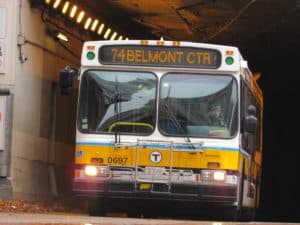The Greater Boston Chamber of Commerce is urging the MBTA’s board to delay its decision “as long as possible” on significant proposed cuts to its commuter rail, bus, subway and ferry operations.
The transit agency is proposing to cut its subway service by about 20 percent, with similar cuts on many bus lines and even steeper cuts – including the elimination of weekend trains and trains after 9 p.m. – on the commuter rail. The moves would save about $140 million as part of the agency’s efforts to close what it says is a nearly $580 million budget deficit in its next fiscal year.
“First, the Chamber appreciates the enormous challenges that MBTA employees at all levels have managed this year, in particular their work to keep the system operating and passengers safe. We acknowledge that significant ridership drops exacerbated the MBTA’s financial challenges, and the agency must create plans to adapt to changing demand,” Chamber president and CEO Jim Rooney said in a letter submitted as testimony to the MBTA Fiscal and Management Control Board on Friday. “However, public transportation is an essential aspect of any thriving city and with funding made available in the CARES Act, the MBTA does not face a budget gap in fiscal 2021. As we navigate our way out of this pandemic and turn our focus to an economic recovery, a strong public transportation system will ensure that we do not encourage the use of single occupancy vehicles and a return to gridlocked streets”
Instead of unilateral cuts by the MBTA, the state legislature should assess proposed cuts along with other “competing state priorities,” Rooney said.
“The state needs to have a holistic fiscal 2022 state budget discussion that considers the balance between service reductions, increased borrowing, and additional revenues,” he said. “Given the importance of public transportation to the region, the Chamber continues to support additional state revenue for the MBTA, including temporarily increasing transfers from the general fund to sustain operations during and immediately after the pandemic.”
The state should raise fees on Uber and Lyft and incresae the gas tax – which has risen only 14 percent since 1991, Rooney noted, despite increases in MBTA fares of over 200 percent –to increase funding for transit.
The MBTA board should also take into consideration the improving prospect of federal money following improving prospects for another economic aid bill passing through Congress before Christmas, he said.
If the T decides to cut service – many of the cuts will take effect in the spring when a COVID-19 vaccine is expected to begin being widely available – the agency could be in a position of being too short-staffed to help relieve rising pressures from car traffic.
“The Authority’s planning efforts must respond to the decisions of residents and employers, not create a dynamic in which demand is influenced by a lack of supply,” Rooney wrote.




 |
| 


